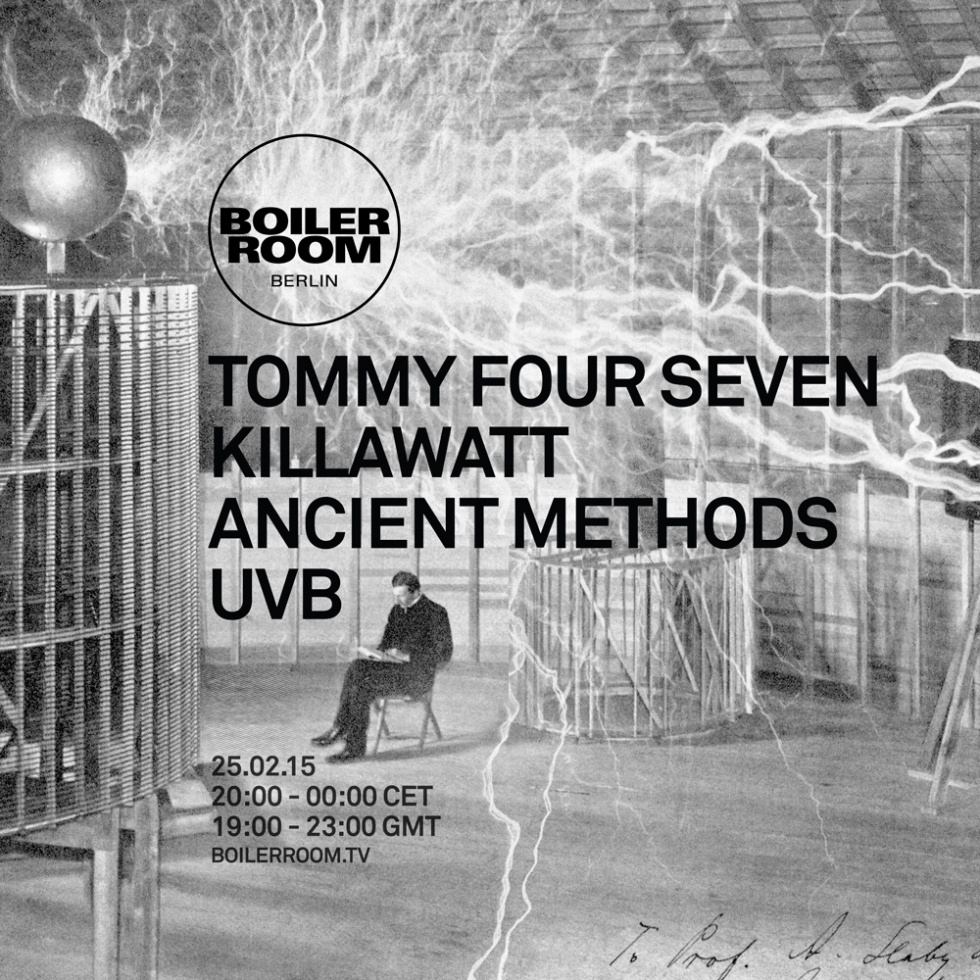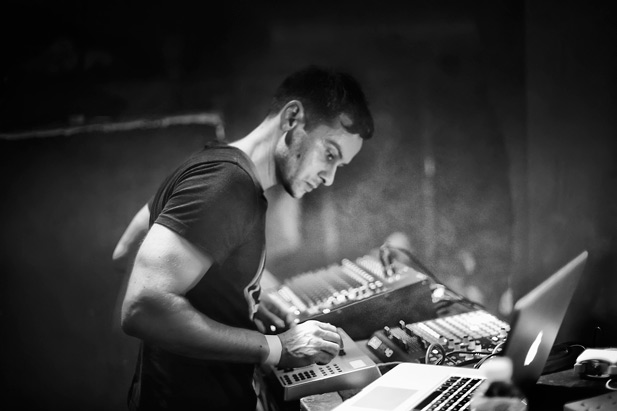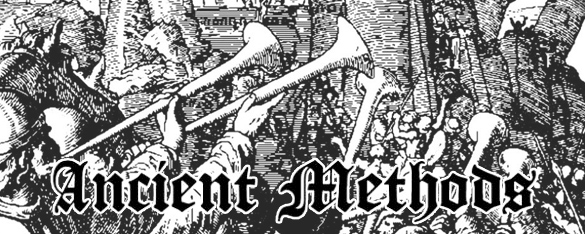
The insistent flashes of light illuminate the darkness in slices, ripping past the writhing bodies and lashing against eyes already ruined by smoke and sweat. Though the strobe makes visibility difficult and the fatigue of overload (dance, alcohol, serotonin) makes the mind struggle at comprehension, this monstrous cube holds no real fears. It is a machine: a tool in the hands of a man who has shaped its sound system into a soul-hammer. Illuminated only by the red glow of the electronics surrounding him, he piles on wave after wave of metallic beats before unleashing a distorted low-end to finish grinding the auras of all listening into ephemeral hackfleisch. This modern monstrosity of sound is all part of the Ancient Methods of Michael Wollenhaupt.

In a city swarming with producers, DJs and an overwhelming amount of Doc Martens, Wollenhaupt has managed to forge a uniquely blackened brand of industrial techno danceable enough to get Berlin’s boot-clad feet moving, yet seductively mechanical enough to make Tetsuo: The Iron Man rev his dick drill.
Since 2007, the name Ancient Methods has adorned both live project and label for Wollenhaupt (and, until 2014, his former partner Conrad Prutzmann). A variety of other aliases and projects, including Trias and the Prutzmann/Regis collaboration Ugandan Methods, further his ambitious goal of obliterating dance floors across the world. 2015 finds Wollenhaupt hustling hard; along with more remixes and collaborations, he’s also planning a new Ancient Methods record release.
It’s not merely the bleak, machine-like atmospheres inherent in this churning mass of sound that turns the mind and feet to darkly jubilant celebration; certainly there’s plenty of that going around in electronic music. Rather, it is the human elements that set this music apart: a snippet of half-decipherable vocals here, a whisper of organic instrumentation there—that somehow vital element of malfunction in the complex gears of structured dance, caused by the intrusion of flesh. In this sense, there’s a distinctly pagan feeling to the music of Ancient Methods that evokes the aural essences of gods far older than the fleeting sensory pleasures worshipped in techno clubs. If Berghain is a church, Wollenhaupt is a mobile Stonehenge.
Before his Boiler Room debut, get a closer look at the mind behind the methods.
DANIEL JONES: Your last EP referenced the Seventh Seal. Obviously the more darkly inclined sides of the industrial/techno scene have a penchant both for apocalypticism and minimalistic, monochromatic movie aesthetics as well as religion and magic in general. How much does this influence your own work?
MICHAEL WOLLENHAUPT: Obviously the title of the Seventh Seal references the eponymous Bergman movie, but since I have a soft spot for ambiguous expressions and meanings I thought that it would be an appropriate title to announce the termination of the previous “Methods” 12-inch series. However, there might be a subconscious influence of art and non-musical aesthetics. In light of how many quotes and references I use, I think that above all movies have the most direct influence on my work.
I find vocals to be an under-used element in techno clubs; as enjoyable as it is to sometimes lose yourself in the repetition of rhythm, it’s even more rewarding to be pulled out of it by the sudden shock of a beckoning word or a foreboding fragment of phrasing. Do you have any plans to incorporate more elements of voice into your own work, as in your Bourbounese Qualk remix – either in a direct way or as a subtler sound element?
I quite frequently use voice sampling. I like the use of the human voice; it’s one of the most versatile instruments. Almost all Ancient Methods tracks have more or less obvious vocals—mostly processed vocals as sound elements. Previously I had also used my own vocals on the Black Egg remixes, but unfortunately I am neither a good singer. Nor have I found the time to write lyrics. So, for the moment, I will stick with sampling and processing vocals.
How do you perceive your music? What thoughts does hearing it inspire in you, and what do you aspire to do within its framework?
I don’t really listen to my own music, or techno music in general. I rarely draw my inspiration from hearing such music. The techno aspect is almost reduced to a mere physical, functional inspiration that makes me learn how music can work physically on a dance floor. Thus what I aspire to do within the framework of techno is attempt to achieve a maximum impact on the dance floor, as well as incorporate outside influences I draw from any other music into this frame. In particular I find it very inspiring to remix bands like Black Egg or Bourbonese Qualk—bands that are obviously quite different from what I am doing—and to transform these songs. Much of my work this year will find me leaving the well-worn paths of Ancient Methods.
What sounds are currently inspiring or enthralling you, both within the electronic scene and without?
I constantly keep exploring old and new music. It’s almost impossible to list all the music I am getting excited about. In general, I feel that there is finally more and more of a blend taking place between the darker music genres. Scenes are merging, which has always been the creative key for new developments. This might be my personal perception only, but I feel both people within the techno scene (if there’s still such a thing in Berlin) and without have become more open to different music. What’s happening in the fringes is the most exciting thing for me right now.
What recent live performances have blown you away?
The recent Youth Code show at the Kollaps Festival blew me away. It had the energy level of a good punk concert. These guys were delivering the freshest EBM around.
What’s your take on DJ-as-performer? Not so much crowd-pleasing gimmicks, but visual aides such as costumes, projections, art and dancers as well as added instrumentation.
I don’t see myself as a performer regarding non-musical forms of self-expression. I’m kind of traditional in this regard; it’s still the music that matters, gimmicks like visuals can never be more than a nice topping. With this traditional approach to DJing comes a sort of responsibility for the crowd, which should at least be pleased when the DJ set is finished.
An exciting DJ set, though, is never pleasing the crowd by giving them what they are used to hearing, but rather taking them to something that might be new to them. Since I can’t think of anything more boring than listening to functional techno tracks all night long, I have to labor over the above mentioned framework-image. I see techno as a great tool to build a frame that is not only designed for better accessibility but also for a greater physical, bodily way of experiencing music. The magick happens inside the frame.

Ancient Methods plays alongside Tommy Four Seven, Killawatt and UVB next Wednesday (25th) in Berlin. More info HERE